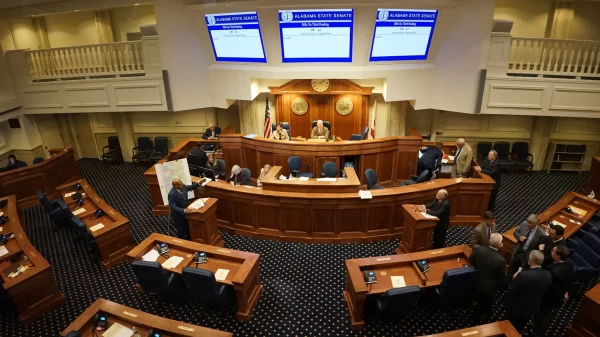By Grant Hallmark
Alabama Political Reporter
“It’s hard to argue against a 70 percent drop in meth labs,” says Jefferson County District Attorney Brandon Falls of Mississippi’s prescription-only pseudoephedrine (PSE) law.
While the county’s chief prosecutor said that he would like to know what kind of effect Alabama’s current law has had on meth lab incidents, he was amazed at the numbers from Mississippi and Oregon. “If the current law was having a similar effect” then there wouldn’t be a need to go to the trouble of implementing a new law. However, if going to prescription only is as advantageous as it seems, “we have to look toward the [prescription-only] law.”
As stated in previous coverage, the prescription-only laws in Mississippi and Oregon have caused dramatic drops in meth lab incidents (discovery, destruction, clean-ups of meth labs). In Mississippi, the law caused the incident rate to drop by 70 percent in its first year. In Oregon where the law has been in effect since 2005, the rate has dropped by 98 percent. There is no doubt that these two states have felt the positive impact of the law. However, there will be inevitable push-back from both over-the-counter medication associations and a segment of the public that uses PSE often and are not exposed to crystal meth.
“People who never see meth, who don’t face it… they probably don’t care,” Falls said. To them, all they see are “extra steps, extra hurdles. And they ask, ‘Why am I being punished?’”
This is not the only possible obstacle for a prescription only law. A well-funded lobbying effort by the Consumer Health Products Association (CHPA) has been exacted in several other states to defeat similar bills. This organization praised Governor Bob Riley and the Democratic leadership in the legislature before the 2010 midterms for passing an electronic sales tracking system that would track all sales of PSE. Linda Suydam, the president of CHPA said the e-tracking system “is the only solution that works across state lines.”
However, with such staggering results from Oregon and Mississippi, it is difficult to imagine that a prescription only law is not a possibly more effective solution.
“There is a myth out there,” Falls said, “that law enforcement is more concentrated on meth than crack or cocaine.” He said that is not true. The JeffCo DA said that meth is simply the newest thing. If we had a problem with crack or cocaine production in the state and “if you said, ‘there is a fairly simple law that would cause a 70 percent drop in crack production,’ wouldn’t we do it?”














































